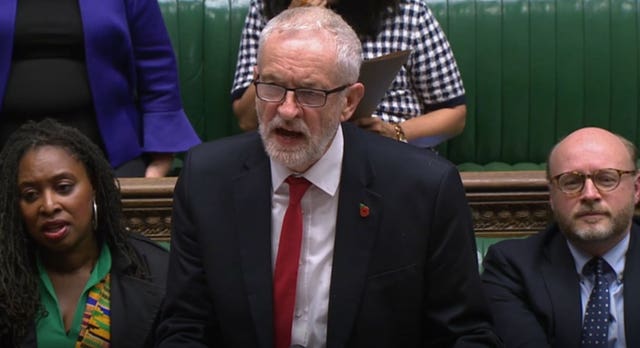Boris Johnson faces more resistance from MPs in his quest for a pre-Christmas election with the Liberal Democrats insisting they are not prepared to accept his preferred date.
The prime minister has put his Brexit deal on hold in an anticipated bid to convince the commons to vote on Tuesday for a 12 December election in his fourth time of asking.
But he may again be defeated with the date proving controversial for both the Lib Dems and the SNP, who have signalled support for a poll three days earlier, while former Tory chancellor Philip Hammond said it “frankly appals” him that the process of getting the Brexit Withdrawal Agreement bill (WAB) passed would be halted for an election.
A Number 10 source suggested the Government could accept a 11 December election if MPs seek to change the date from 12 December on the draft legislation due to be scrutinised by the commons on Tuesday afternoon.
Lib Dem MP Chuka Umunna said his party is against holding a general election on Johnson’s preferred polling date of 12 December, telling BBC Radio 4’s Today programme: “It cannot be the 12th.”
However, Umunna signalled the Lib Dems could be flexible over their own preferred election date of 9 December.
He said: “We will see what else they come forward with. We have got to break the gridlock.”
He added: “We are not prepared to accept the 12th. If you have the 12th, it presents an opportunity for the Government to try and get their Withdrawal Agreement bill through.
“We know that they have a record of going back on their promises and breaking the law, so we cannot trust them on that.”
Pressed on whether 9 December would be more acceptable than 12 December, shadow international trade secretary Barry Gardiner told the programme: “It certainly would.”

The PM failed on Monday to get the two-thirds majority needed to secure an election under the Fixed-Term Parliaments Act (FTPA), but was planning on a fresh attempt a day later.
The anticipated short bill setting aside the FTPA would instead require the support of a simple majority of MPs and is expected to be hurried through all commons stages in a single day.
One reason the Lib Dems and the SNP favoured going to the public on 9 December is because they believe it would prevent the Withdrawal Agreement bill (WAB) being passed.
But commons leader Jacob Rees-Mogg attempted to win them over by confirming that the bill to implement the PM’s new deal would not be brought back before MPs.
The WAB was put on hold last week after Johnson failed in his attempt to fast-track it through the commons in just three days.

But there is some disquiet, with Hammond, who lost the party whip over his Brexit stance, telling the Today programme: “I fear that the real narrative here is that the Vote Leave activists, the cohort that has seized control in Downing Street, and to some extent in the headquarters of the Conservative Party, wants this general election to change the shape of the Conservative Party in parliament.”
He added: “The idea that now we would use our precious time to halt all of this process for five or six weeks and go out and have a general election frankly appals me.
“I think the government is trying to create a narrative that parliament is blocking Brexit and therefore we need an election.
“But, that is simply untrue.”
A source close to the 21 Tory rebels said: “Claims from No 10 that discussions with the 21 re the WAB suggested there was not sufficient support to progress, are untrue.”
The source said 17 of the 21 ex-Tories voted for the bill at Second Reading, adding that all of those would support a sensible programme motion of around four days in committee.
The source said: “parliament has given a clear indication to proceed with the bill, albeit at a slightly slower pace. No 10 are attempting to justify the election they crave, by blaming those who want a sensible solution.”
The government fell 135 votes short of the 434 required to get an election under the FTPA on Monday.
EU leaders had earlier confirmed they would extend the UK’s withdrawal date to 31 January, in line with the request the PM was forced to make under the terms of the so-called Benn Act.
Jeremy Corbyn said Labour – who abstained on the FTPA motion – would want to scrutinise whatever the government put forward.
Fears remain that a no deal could be forced through and there are concerns a December election could put off voters.
The SNP’s Westminster leader, Ian Blackford, said they would need a “cast-iron guarantee” that the PM would not try to bring back his deal to parliament.
Commons speaker John Bercow said opposition MPs would have the ability to table amendments to the Bill on Tuesday.
Government sources had suggested the proposed Lib Dem-SNP timetable – which would mean parliament would have to be dissolved at one minute past midnight on Friday morning, was too tight to deliver.


















